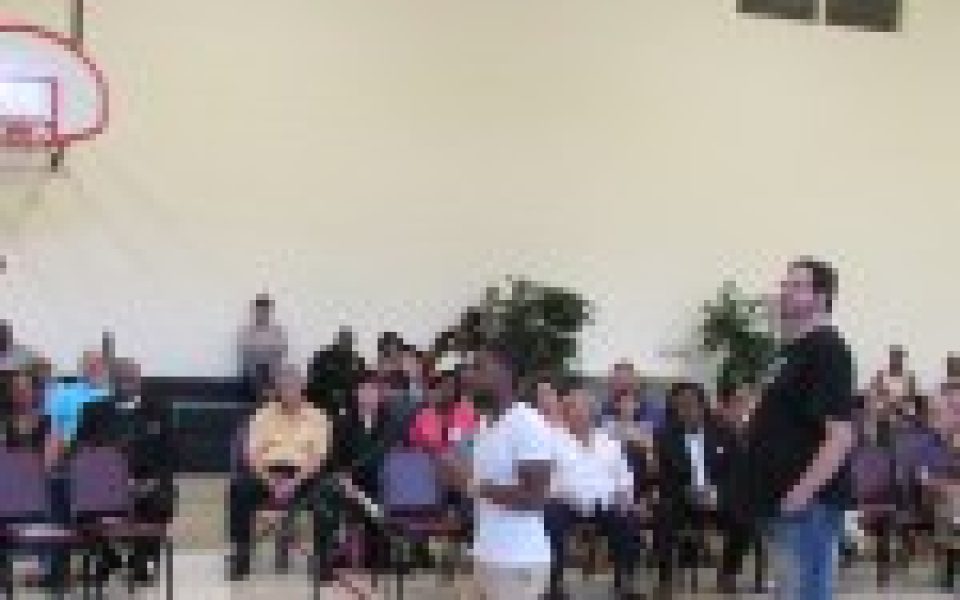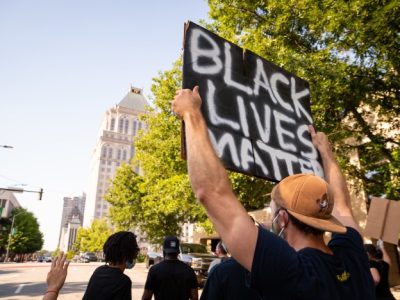Greensboro Mayor Nancy Vaughan embraced the Rev. Nelson Johnson before giving her concluding remarks at a town hall meeting on policing and race before an audience of about 200 on a sweltering Sunday afternoon in the Howard Chubbs Enrichment Center at Providence Baptist Church.
She marveled at the fact that the two have been meeting, along with a cohort of handpicked community members selected by each, since March 28, 2015.
“We could have had a baby and then some,” the mayor said, prompting a titter of prurient laughter.
Vaughan recognized her gaffe, and recovered — partially.
“We birthed this baby,” she added. “I don’t know where your minds were. Mine is somewhere else.”
She could be forgiven for having a lot on her mind. In a couple hours, the mayor, who also serves as the executive director of the pro-LGBTQ Guilford Green Foundation, would be emceeing a candlelight vigil at Governmental Plaza for the victims of the Orlando Pulse massacre.
Vaughan was eager to promote a view that months of dialogue have been productive, ticking off accomplishments.
She said the Greensboro police have already increased their training for interacting with citizens with mental health challenges.
Encounters between police officers and people with behavioral or mental health challenges all too often end in tragedy — a point underscored by the release of video of the fatal shooting by Officer Tim Bloch of Chieu-di Thi Vo. Many in the audience who viewed the video of Vo carrying a knife as she moved aimlessly down a sidewalk said they concluded that her death was unnecessary.
Jack Register, executive director of the National Alliance on Mental Health-North Carolina, said this state lacks an infrastructure for addressing mental health. For the benefit of comparison, he said a person could find themselves injured in a car accident and count on getting their arm set within in the span of a couple hours.
“If you have a psychiatric breakdown on the way home today — please don’t let it happen — you may end up in jail, you may end up in the emergency room for days, you may end up dead before you get the services you need,” Register said. “It’s unacceptable.”
Continuing her upbeat assessment of progress in community-police relations, Vaughan said, “When the police go out, they don’t seek a lethal interaction. They want to police compassionately. Maybe we need to give them better tools to do that. The chief made a pretty bold move last November about not stopping cars for minor infractions. He caught a lot of flak for that.”
She added that the police department is seeking legislation to make resisting arrest a separate charge from obstructing and delaying arrest. In Vaughan’s view, that could help filter out frivolous charges for resisting arrest — which disproportionately fall on black people — when there is no underlying charge.
And Vaughan is urging the department to institute a formalized consent process for police to obtain permission to search motorists’ vehicles — also disproportionately affecting black people — either through a written form or an interaction recorded on a police body camera.
One issue that might be harder to resolve is what’s known as contact policing, or the broken-windows approach. Pioneered by New York City Police Commissioner William Bratton in the early 1990s, the approach focuses on aggressively policing quality of life crimes such as disorderly conduct, drugs, prostitution and vandalism with the goal of preventing more serious crime.
“We are spending too much time and too much resources on harassing poor people and people of color, and this has got to stop,” said Claude Barnes of the Beloved Community Center.
Chief Wayne Scott has said he supports contact policing, citing a strategy called Data-Driven Approaches to Crime and Traffic Safety. Last November he told Triad City Beat: “If you put traffic units in the area, then crime will fall in that area.”
An analysis of traffic stop and search data released in March by the Greensboro Police Department with assistance from academics at NC A&T University and UNCG in some ways supports the notion that contact policing is driving racial disparities.
The study was billed as an independent review, following a critical study by UNC-Chapel Hill professor Frank Baumgartner and a string of media stories, but it was actually produced by the police department with the assistance of academics from local universities.
The study found that traffic stops are “most highly correlated” with Part 2 crimes such as drug and weapons offenses, simple assault, domestic disputes and vandalism, and quality-of-life crimes. Traffic stops of blacks are highly correlated to geographic areas with high numbers of quality-of-life crimes while stops of whites are only moderately so.
Despite the headline-grabbing finding in the report that there is “no evidence supporting the claim that disparities observed in the city of Greensboro are the result of racism,” the report contained another somewhat contradictory conclusion buried deep in the pages.
“The search disparity is partially explained by the level of crime in the area,” the report states. “But we cannot identify every reason for all the disparity at this time and with this data. The possibility of police bias accounting for a portion of the observed disparity may exist.
Join the First Amendment Society, a membership that goes directly to funding TCB‘s newsroom.
We believe that reporting can save the world.
The TCB First Amendment Society recognizes the vital role of a free, unfettered press with a bundling of local experiences designed to build community, and unique engagements with our newsroom that will help you understand, and shape, local journalism’s critical role in uplifting the people in our cities.
All revenue goes directly into the newsroom as reporters’ salaries and freelance commissions.





Leave a Reply